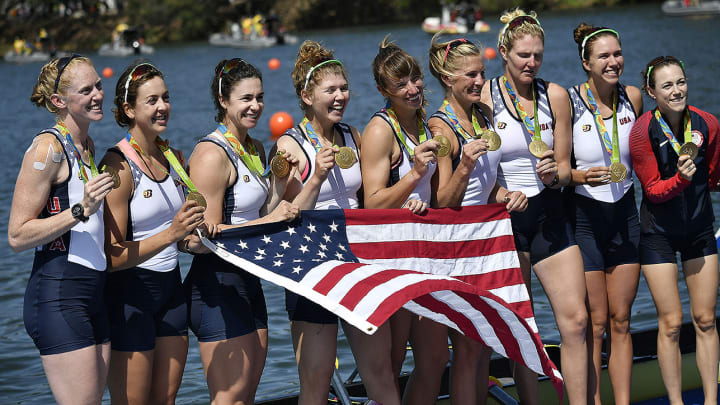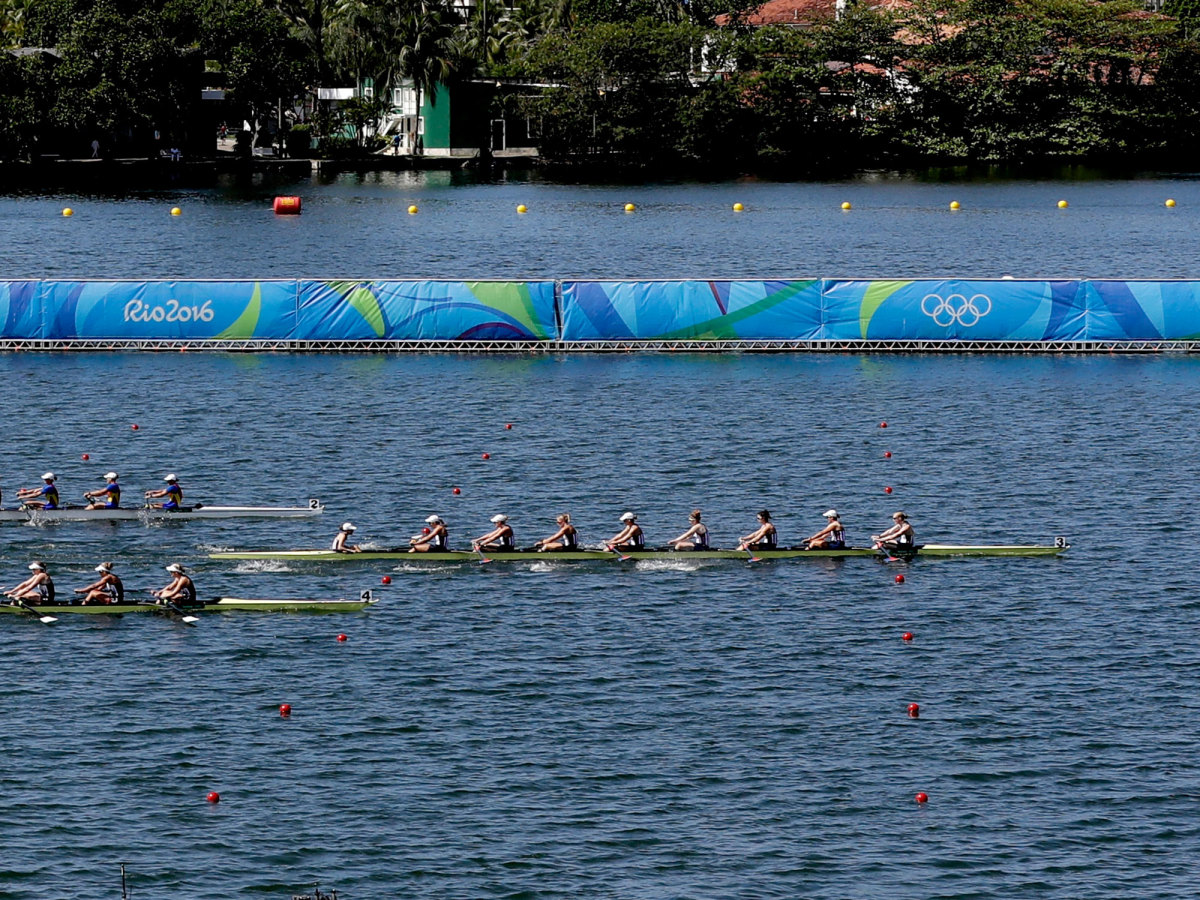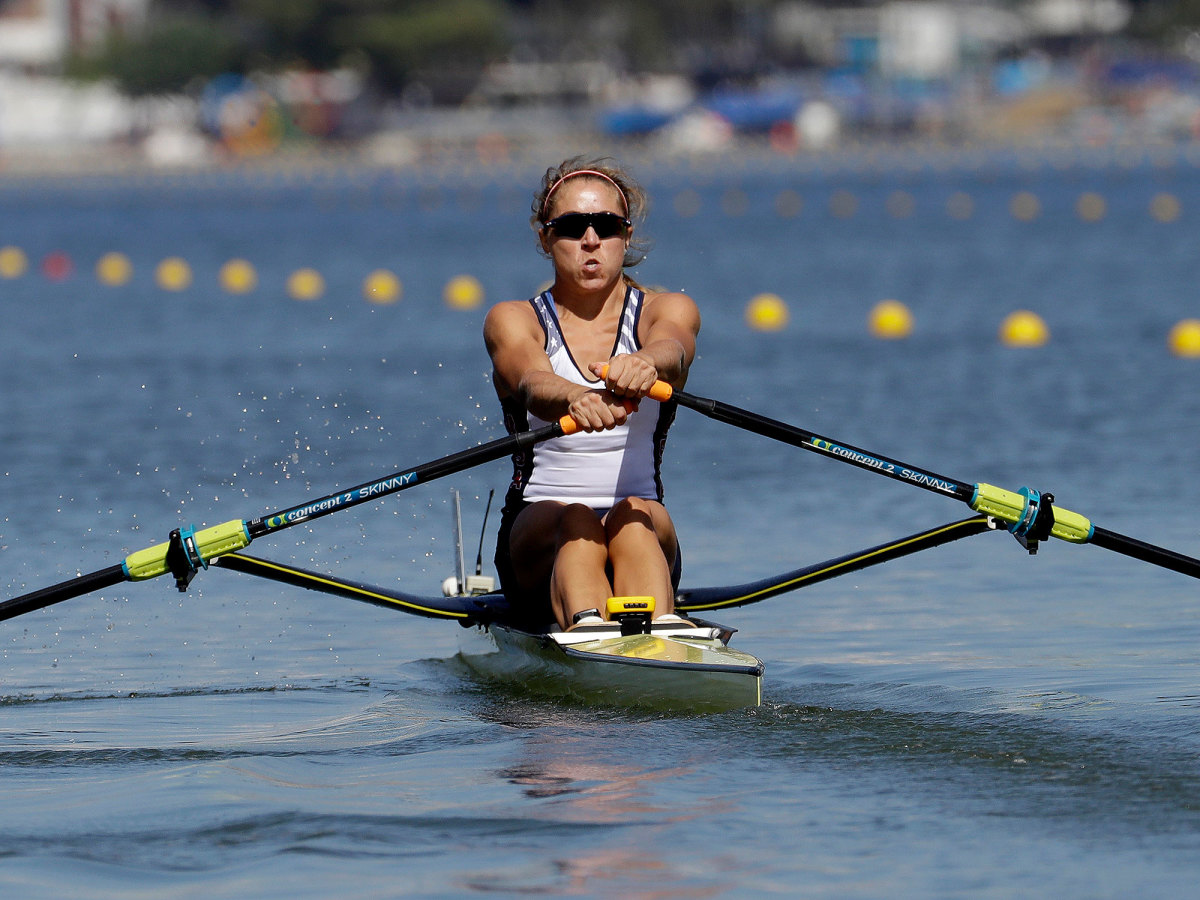The dynasty continues: U.S. rowing women's eight wins third-straight Olympic gold

They may not have a passel of different events in which to compete—different strokes or relays—but when it comes to dominance in Olympic waters, the U.S. women’s eight once again proved itself right up there with swimmers Michael Phelps and Katie Ledecky.
On a bright, clear Saturday morning on Rio’s sparkling Lagoa Rodrigo de Freitas, the American squad of Amanda Elmore, Elle Logan, Meghan Musnicki, Tessa Gobbo, Lauren Schmetterling, Amanda Polk, Kerry Simmonds and Emily Regan, driven on by Katelin Snyder in the coxswain’s seat, produced a churning drive over the final 500 meters of the 2000-meter course to cross the line first in 6:01.49, more than two seconds clear of Great Britain and third-place Romania.
It was the third-straight gold medal in the event for the U.S., adding another chapter to what is the longest-running dynasty in Olympic sports. Beginning with a victory in world-record time in the 2006 world championships, the U.S. women’s eight has now won 11 consecutive world or Olympic titles.
Retirement waiting, Phelps settles for silver in final individual Olympic race
Coming into Rio, the U.S. women knew that they would be rowing with the proverbial bulls-eye on their unisuits, but they insisted they were focused not on the pressure of extending the streak—not on “going up to 11”—but only on getting the most out of their own boat. And out of themselves.
Moments after her team’s victory, standing in the mixed zone with red-white-and-blue-clad fans calling to her and waving flags from the stands above, number-two seat Kerry Simmonds spoke for herself and for her boat mates when she said, “We are encouraged by the women who came before us and built this legacy of excellence, and we want to make them proud. But we all know how hard we’re working and we have such trust in the group. It’s like a family. We knew that we just had to work together.”
Which is exactly what they did on Saturday, rowing controlled and steady as Canada and the Netherlands surged ahead early, and then driving through at their own tempo to pull away from the challenges of Great Britain and the Romanians. After the race, coach Tom Terhaar, who has guided the U.S. women’s eight to every one of its 11 golds, pronounced himself “very relieved” at the victory. The rough water conditions throughout the week and the resulting scheduling changes didn’t do anything to ease his nerves, but it was clear that the 46-year-old coach had been here, done this before and that he had utter confidence in his athletes.

Standing outside the interview room in perfectly dry clothes—his athletes, recognizing the notorious reputation of Rio’s water, passed on the traditional coach’s post-race dunking (“I’ve got children,” he said with a laugh)—Terhaar explained, “People are either going to try to get up in front or try to charge later. That’s basically it. And we anticipated it.”
Asked how the U.S. has been able to maintain its success, Terhaar said, “Just a really good group. They just keep working and working. Talented athletes and a lot of support for each other.”
That sense of togetherness, of family, has been the foundation of the success of the American women’s program. Terhaar points out that the eight oarswomen in the Olympic boat were selected from a pool of some 28 athletes, all of them of world-class level. By mixing and matching different women in pairs and in eights, comparing times and observing the rhythms of the different combinations on the water, he and his assistants were able to build a crew that was once again able to turn back the challenges from every other nation.
The lineup for Rio was officially determined only on June 21, and that Olympic nine rowed together in competition for the first time on Aug. 8, powered serenely through their heat to take first, eight seconds clear of the Netherlands, and lock up their rightful spot in the finals.
“It’s great to get a race in together and get our rhythm,” said Musnicki after that effort. “Now we can settle in and prepare for the final.”
Once again, track & field's problems overshadow Bolt-Gatlin showdown
Musnicki has been a big part of helping the Americans settle in. The 33-year-old was one of just two Olympic veterans on the boat, having earned a gold medal in London. The other old hand, Eleanor Logan, 29, had been on the team in both 2008 and ’12, and on Saturday she became the first U.S. rower to win three consecutive golds.
“Elle is a very calm presence in the boat,” said Simmonds after Saturday’s race. “She doesn’t say a lot, but when she does, it carries a lot of weight. It gives us confidence in the work we’ve put in over the last, well, four years. She keeps us… centered. Centered is the word.”
For her part, Logan makes clear that the U.S. dynasty is, in effect, a living, ongoing phenomenon. “This Olympics has been a totally different experience,” she said on Saturday, her third gold medal settled comfortably around her neck. “Meghan and I feel so lucky to be part of this team. These new girls, their hunger to be the best—their hunger to get to that line—has pushed us to a new level that we didn’t know we had. We’re all still getting better.”
For the rest of the women’s rowing world, that message must be a daunting one to hear.

Single success
In another successful note for U.S. women’s rowing, U.S. single sculler Genevra Stone powered through to a silver medal just 20 minutes before the eight’s victory, behind reigning world champion Kimberley Brennan of Australia. The product of a literal rowing family—her mother, Lisa Hansen was on the 1976 Olympic squad, and her father, Gregg Stone was a national team member—the 31-year-old known to all as Gevvie is a graduate of Princeton and Tufts University School of Medicine who hopes to become an orthopedic surgeon. “
Residency applications aren’t due in until September,” said a beaming Stone after her race in answer to the usual “What next?” question. “So for now I get to enjoy this Olympic thing.”
